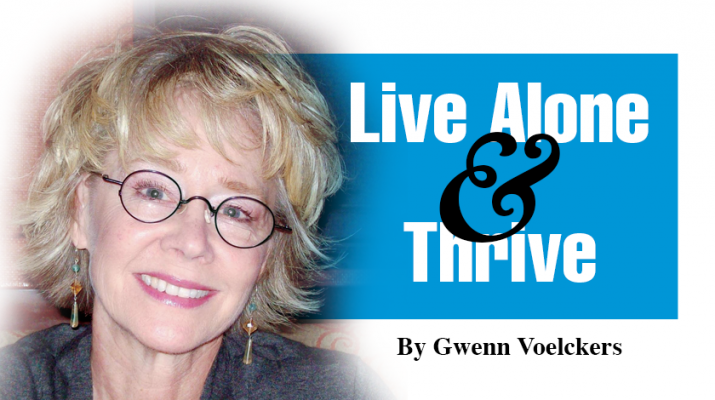For some women, living alone in mid-life is a welcome change, especially if they are coming out of an unhappy marriage. Being alone can offer a respite from the stress and heartache of a relationship gone bad. But for many others, the change is not welcome, and the prospect of living alone can appear on the horizon as a daunting challenge.
The ending of my own marriage years ago fell into the latter category; it was not a welcome change. But it was a change nonetheless and one I had no choice but to accept and ultimately to embrace.
It took some time and some hard-knock lessons, but I eventually discovered a resourcefulness within myself that enabled me to forge a joyful and meaningful life on my own. It is that same resourcefulness that gave me the confidence to organize and offer workshops to support other women in the similar circumstances.
“Living Alone: How to Survive and Thrive on Your Own” is a three-part workshop I developed to help women discover the know how to create a satisfying and enriching life on their own. I’ve been leading the workshop for over 10 years now, and often get questions from “In Good Health” readers about what the workshop covers and how it is organized.
In this month’s column, I am pleased to answer the most frequently asked questions:
Q. What is the purpose of the workshop and what do you cover?
A. Because I’ve walked in a similar pair of shoes, I can empathize with the challenges you may be facing. And I can support your efforts and desire to feel more content on your own.
In many cases, it starts with a change in attitude, and my workshop will help you think differently about living alone. Specifically, I cover how to overcome loneliness and other emotional pitfalls, banish negative thinking, rediscover your true self, socialize in a couples’ world, and otherwise embrace what may be a once-in-a-lifetime opportunity to create a wonderful and rewarding life on your own.
Feeling comfortable with your independence will improve your chances of finding happiness, and it will improve your chances of finding a new healthy relationship, if that’s what you desire. When you feel better about yourself — more self-assured and resourceful — life on your own or with a special someone can be richer and more satisfying.
Getting good at living alone takes practice. There’s no magic pill and it doesn’t happen overnight. But it can happen, and good things can result.
Q. Who attends the workshop?
A. Most, but not all, of the women who attend the workshop are between the ages of 40 and 70, and have come out of long marriages or relationships. Some are on their own for the first time in their lives. All have one thing in common: They want to get a better handle on living alone and to feel more content with themselves and their independence.
Many see this workshop as an extension of the support they are receiving from friends, family, a therapist or their congregation.
Q. I’m still grieving the loss of my marriage/spouse. Is this workshop right for me?
A. Good question. My Living Alone workshop is a “nuts and bolts” practical workshop to help women feel more whole and complete on their own. It is not a grief or mental health support group. If you are still in the grieving process and seek support, I recommend grief counseling or the help of a professional counselor.
Q. What are your credentials?
A. I am not a licensed professional. My expertise is born out of real-life experience. I’ve “been there.” I emerged from my divorce feeling very deflated and very alone, faced with both the practical and emotional challenges of living alone. After some hits and misses, I found my way and now thoroughly enjoy the freedom and independence that comes with living alone.
My time-tested experience, resources, and tried-and-true tips and techniques have inspired and helped many workshop participants. My workshop has been the jump-start they needed to reclaim their lives.
Q. How large are the workshops?
A. Ideally, I like to have eight women in each workshop, although, on occasion, I have led workshops with a few more and a few less. A group of about eight gives everyone a chance to actively participate and benefit from the experience. The sharing quickly gives way to a comfortable camaraderie and it’s not unusual for nice friendships to develop among participants.
Q. Where are the workshops held?
A. At House Content Bed & Breakfast in Mendon, near Rochester. House Content is a little historic gem, situated on a picturesque six-acre site, surrounded by horse farms and parkland. Reminiscent of a quaint English cottage, this setting serves as a peaceful and inspirational setting for the workshops.
Q. I’d like to sign up for the workshop. What’s my next step?
A. I like to speak with potential participants by phone, as a first step. That way, I can answer your questions and you’ll know better whether this workshop is right for you. Just call me at 585-624-7887 or email me at gvoelckers@rochester.rr.com, and we’ll schedule a time to talk. You’ll also find information about my upcoming workshop in the Calendar of Health Events included in this issue.
Gwenn Voelckers is the founder and facilitator of Live Alone and Thrive, empowerment workshops for women held throughout the year in Mendon, New York. For information about her workshops or to invite Gwenn to speak, call 585-624-7887, or email gvoelckers@rochester.rr.com.

